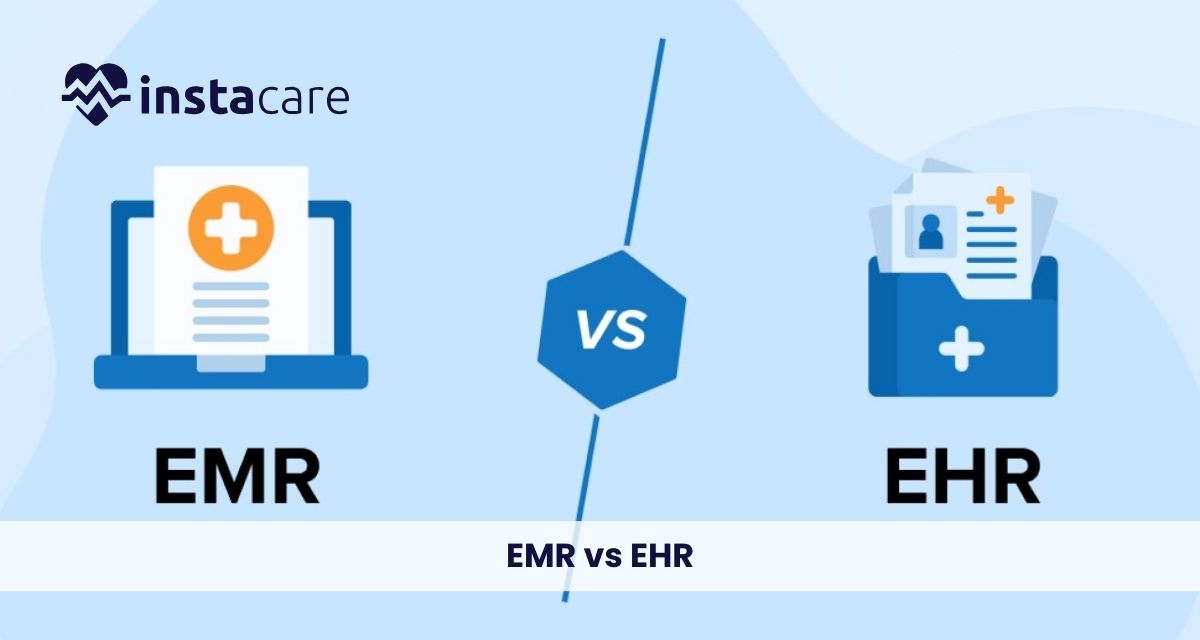Last updated on Monday, 14, October, 2024
One of the terms that are used in the vibrant healthcare technology arena are Electronic Health Records and Electronic Medical Records. Although they look very similar in writing, they serve very different purposes and have very different impacts on the healthcare provider. Recognition of what constitutes EHR and EMR is the most critical way to improvement of care for patients and optimise operations for Pakistani healthcare providers in compliance with local laws. It digs deeper to identify the differences between them, the challenges, and benefits associated with each system, and which one might find better for the demands specifically posed by the Pakistani healthcare sector.
Table of Contents
Understanding EHR and EMR
What are EMRs?
Electronic medical records are the electronic versions of paper charts, which are popularly noticed in a clinician’s office. EMRs contain the medical and treatment history of patients under one practice. Its principal use is by providers for diagnosis and treatment, and it holds plenty of benefits.
- Reduce the chances of human errors caused by poor handwriting
- Allow access to the complete medical history of an available patient much faster, hence helping with faster decision-making.
- Easier Effectiveness: Applications related to administrative tasks like scheduling and billing are streamlined.
It has its limitations, though. EMRs typically hold a siloed view within each practice as it is difficult to share information with other practices and providers. Coordination of care would prove tough in such a scenario all the more so given the fact that patients would most probably be treated at various providers’ facilities in Pakistan.
What are EHRs?
EHRs, however are more intensive. They involve much more than the medical histories and also permit exchange in other healthcare settings. EHRs are intended to be shared by a number of different healthcare providers and are meant to facilitate coordinated care. Some of the fundamental aspects of EHRs include: Interoperability. The EHRs will allow the sharing of patients’ information across several healthcare systems, thus facilitating coordinated care.
- Patient Engagement: Most of the EHRs include a patient portal to view and discuss personal health information, as well as interact with providers.
- Data Analytics: Aggregated data by EHRs can be used for research and quality improvement.
- While EHR systems bring many benefits, they also call for much investment and training. Hence, it remains out of reach to many of the Pakistani healthcare providers.
EHR Vs EMR
Scope and Functionality
The most profound difference between EHR and EMR in their primary scope and functionality is as follows:
- EMR: More strict practice, which is followed within the organization.
- EHR: Only for a single practice, to share, integrative approach of health, that is, shared across multiple healthcare settings. Cost
An EHR system would also be relatively more expensive to implement than an EMR system because it is much more complex and has interoperability. Most healthcare providers in Pakistan would find the budgetary cost of such EMRs is an attractive reason to use them, despite their many shortcomings, due to their lack of funds.
Compliance and Regulation
In Pakistan, the health care professionals should adhere to the requirements laid down by the Pakistan Medical and Dental Council (PMDC) and other similar agencies. EHRs are likely to meet this requirement because it can obtain data in a more detailed manner than EMR. However, EMRs are also likely to meet this requirement when all the features of an EHR are integrated.
User Experience
The user experience for both systems can be quite divergent. EHRs can be much steeper to learn and require more formally trained staff to deploy. For health care providers in Pakistan, whose shortage of training resources may impact the use of either system, the relative simplicity of EMRs makes them an attractive choice.
Benefits of EHR and EMR for Pakistani Healthcare Providers
Benefits of EMR
- Cost-Effective: EMRs are relatively cheaper to deploy and to maintain
- Ease of Use: Their user-friendly interfaces will make them be embraced sooner by the health workers.
- Practice-based Data Management: EMRs are constructed based on the practice needs
Benefits of EHR
- Coordinated Care: EHRs facilitate integrated care by providers and in settings, an aspect that is currently of higher value in Pakistan’s decentralized health system.
- Interoperability: EHRs guarantee a smooth flow of information and patient safety, as well as quality in care.
- Regulatory Compliance: EHRs are usually more functional in handling the regulatory compliance, which is always of importance for providers.
Challenges of EHR and EMR
EMR Challenges
- Limited Interoperability: EMRs can’t easily interact with other systems, thus coordinated care is limited.
- Data Silos: Patient data may be confined within a single practice, thus resulting in an incomplete health history of the patient.
EHR Challenges
- Expenses: Such EHRs are highly expensive at first and pose a challenge for most providers in Pakistan’s healthcare sector.
- Training Requirements: Heavily, staff requires training before it can become functional with the application of EHR systems.
- Data Privacy Issues: Issues exist in connection with data security and data privacy related to patients’ care data, which needs to be addressed.
Which one is Best suited for Pakistani Healthcare Providers?
The best system for Pakistani healthcare providers will depend on several factors such as the size of the practice, constraints on budget, and the needs of the patient population. A few considerations are as follows:
For Small to Medium Practices
Smaller practices or clinics will favor the EMR option because of its low cost and ease of use. These systems will result in streamlined operations minus all the interoperability that EHRs require.
For Larger Healthcare Systems
EHRs are generally a better option for large healthcare systems or medical institutions. Information sharing across different departments and external providers will result in better patient outcomes along with care coordination enhancement.
Future Considerations
The way of developing health care toward more integrated models of care through the development of the health system in Pakistan is necessary for requiring comprehensive data sharing. For the short term, EMRs may suffice, but the long-run focus will probably be on EHRs due to the increasing need for coordinated care.
Conclusion
EHR and EMR remains at the centre, but a view of some of these practices goes as far as to suggest that small practices can just opt for EMR, but larger ones need EHR for delivering the best possible care to patients. While EMRs may be able to bring efficiencies right from day one to small practices, EHRs are poised to bring long-term benefits in coordinated care in large healthcare networks. Understanding these systems is increasingly going to be a function of how technology keeps evolving and finding applications in healthcare providers seeking better patient outcomes and smooth operation in Pakistan.
FAQs
1-What is EHR and EMR?
In summary, they differ by scope: EMRs are applied mainly to a single practice and carry information related to the patients of that specific practice. EHRs, however, target data sharing between various health care settings, hence allowing for a broader view of patient health.
2-Are EHRs more expensive than EMRs?
Yes, EHRs typically involve higher initial cost due to complexity and interoperability. However, large health systems, among others, will likely factor in a wide range of long-term benefits to patient care and to data sharing.
3-How does EMR / EHR impact the patient care in Pakistan?
EMRs help individual practices to work more efficiently, whereas EHRs are used for delivering better coordinated care by multiple providers. So in a divided healthcare system as is found in Pakistan, EHR may be extremely useful for patient outcome and safety.



